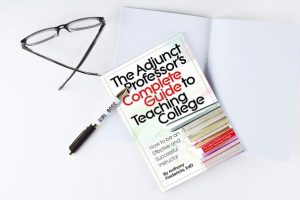Mind Matters
An Occasional Column by Anthony D. Fredericks
Frequent Questions from New Adjunct Professors
 If you are an adjunct professor, know one, or are about to become one, here are some of the most frequently asked questions about teaching college courses. It probably wouldn’t surprise you to know that these queries are asked as much by “newbies” as they are by experienced instructors.
If you are an adjunct professor, know one, or are about to become one, here are some of the most frequently asked questions about teaching college courses. It probably wouldn’t surprise you to know that these queries are asked as much by “newbies” as they are by experienced instructors.
- What if my students don’t like me? Guess what, not every student is going to like you. By the same token, you won’t necessarily like every single student who takes up residence in your classroom. Look back on your own educational career. Did you like every single instructor you had in college? Most likely, no! The same will hold true in your own classroom. It’s important to remember that good teaching is not a popularity contest – it is about changing lives for the better. If you go into this new position to be everyone’s friend, then you’re in it for the wrong reason. If you go into it to make a difference, then you’ve chosen the right reason. Face it, teaching has nothing to do with the number of “Likes” you have on your Facebook page; but it has everything to do with changing lives for the better.
- What if I make a mistake? Terrific! That’s what good teaching is all about. It’s how you handle the mistakes that is more important than the mistakes themselves. You’ll make lots of mistakes…hundreds or them, perhaps even thousands of them. Every teacher does. I’ve made a million or so. I recognized the fact that I’m imperfect and, in fact, I celebrated it. If I make a mistake in a class, I let students know and then I set about to fix it. Perhaps I’ve shared some erroneous information or erred in computing a student’s grade. I fully admit my error to students and show them I’m willing to correct the mistake and make things right.
I’ve been learning new things for a long time now…and will continue to do so…as will you. Please don’t try to be the “perfect professor” right out of the box. You’ll frustrate yourself and pile more stress into your day than you need. Know that you might make a mistake or two on the first day…on your second day…on your one millionth day! That’s O.K. – you’re a human being and you’re only being human by making mistakes…but you’re being a teacher when you use those mistakes as learning opportunities – learning opportunities for you as well as for your students.
- What if I don’t know the answer? Great! You now have a most wonderful learning opportunity!! When students asked me a question where I wasn’t sure of the correct answer or I simply didn’t know, I usually responded with something like, “Hey, you know what, I’m just not sure of the answer to that question. Let’s find out together.” First, I admitted that I wasn’t the font of all knowledge. I wanted to send a positive signal to students that teaching, for me, was also a learning process. I know a lot of stuff, but it’s not possible for me to know everything about everything. The same goes for you. Admit to some of your shortcomings, celebrate them, and you’ll be creating a very positive bond with your students. But, it’s the second part of my response that I encourage you to adopt (“Let’s find out together.”). Here is where you send a most incredible message to students: Teaching and learning is a partnership; it’s a joint effort by two parties to satisfy a curiosity or discover an unknown. By letting students know that I’m by their side in this intellectual quest – that I’m willing to share part of the load – I can help solidify a partnership that can reap untold benefits later in the semester. In many cases, I’ll brainstorm with one or more students for ways in which we can work to find an acceptable answer – there’s work to do for me and work my students need to do as well. We’ll come together at a later date to discuss the results of our investigations until we arrive at a satisfactory response.
- What if a lesson “bombs”? They will! Count on it! I’ve created lessons that bombed. I created some “bombed” lessons when I first taught and, guess what, I created some lessons that
 “bombed” just before I retired. That’s O.K. Not every lesson you write will be memorable, inspirational, or successful. Some just won’t make it. But, that’s all part of what makes teaching so exciting. If you set out to try and make every single lesson perfect you will only add to your level of frustration. You need to face this reality: some lessons will fall flat on their face because you forgot a simple ingredient, a critical piece of technology (like, say, your thumb drive), a necessary fact, or slice of research. But, guess what, you will learn from that mistake. And, the next time you teach that lesson it will be much better and much more effective. Trying to write perfect lessons shouldn’t be your goal; your goal should be to create learning opportunities to the best of your ability at this point in time. The longer you teach, the better your lessons will become. It’s like playing the piano – the more you practice (over the years) the better you get. Unless you’re a musical prodigy, you don’t play Liszt’s Hungarian Rhapsody #2 the first time you sit down at a piano – it takes many years of constant and sustained practice to play this most demanding piece. By the same token, it will take you lots of practice to perfect all the skills of an accomplished professor. Don’t expect to do it all in your first college class.
“bombed” just before I retired. That’s O.K. Not every lesson you write will be memorable, inspirational, or successful. Some just won’t make it. But, that’s all part of what makes teaching so exciting. If you set out to try and make every single lesson perfect you will only add to your level of frustration. You need to face this reality: some lessons will fall flat on their face because you forgot a simple ingredient, a critical piece of technology (like, say, your thumb drive), a necessary fact, or slice of research. But, guess what, you will learn from that mistake. And, the next time you teach that lesson it will be much better and much more effective. Trying to write perfect lessons shouldn’t be your goal; your goal should be to create learning opportunities to the best of your ability at this point in time. The longer you teach, the better your lessons will become. It’s like playing the piano – the more you practice (over the years) the better you get. Unless you’re a musical prodigy, you don’t play Liszt’s Hungarian Rhapsody #2 the first time you sit down at a piano – it takes many years of constant and sustained practice to play this most demanding piece. By the same token, it will take you lots of practice to perfect all the skills of an accomplished professor. Don’t expect to do it all in your first college class.
- What’s your best advice? I’ve got three tidbits. First, don’t be so hard on yourself. Remember that every professor has a first class! This is yours! Celebrate it. Know that there will be some bumps in the road. You’ll have a few hiccups, a few muddles, and a few gaffes. It’s inevitable. We all did. Don’t try to be perfect – you’ll frustrate the hell out of yourself if you do.
Second, beg, borrow and steal as many tips, ideas, and strategies as you can. Talk to colleagues, read teacher resource books, go to conferences, pour through professional magazines, and scour the internet. Build up file folders full of innovative, creative and dynamic ideas to share with your students. Be a “packrat of ideas.”
Third, feel free to take risks. We don’t make any progress as a college professor, a hairdresser, an architect, a horticulturist, a doctor, an interior designer, or a computer technician without taking risks. Sure, you may trip or stumble. That’s O.K. You and I and a few billion other people around the world tripped and stumbled (and fell) when we first began to walk. But, guess what? There were plenty of people around to pick us up and get us started again. And, guess what, that’s how it is in teaching college, too. You’ll have lots of people around you to pick you up and get you started again. Your first steps may not be perfect, but with a little practice you’ll be walking…then jogging…then running.
I sincerely hope you enjoy your new journey: learning the strategies and procedures that will make you an unforgettable college teacher – one who inspires students and has a long and productive career. If you are looking for more practical suggestions, you might want to check out the book below.
_____________________

Dr. Anthony D. Fredericks is Professor Emeritus of Education at York College of Pennsylvania. He is an award-winning author of more than 175 books, including The Adjunct Professor’s Complete Guide to Teaching College (“I’ve been an adjunct professor for 4 years, and I wish I had had this handy guide before I started my teaching journey. My teaching will undoubtedly be stronger because of the helpful information here.” – 5-star review)

